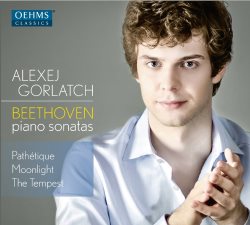|

|
Ludwig van BEETHOVEN (1770-1827)
Piano Sonata No. 8 in C Minor, Op. 13, Pathétique (1798) [18:34]
Piano Sonata No. 14 in C-Sharp Minor, Op. 27, No. 2, Moonlight (1801) [14:26]
Piano Sonata No. 17 in D Minor, Op. 31, No. 2, Tempest (1802) [23:20]
Alexej Gorlatch (piano)
rec. 4-6 July 2013, Studio 2, Bayerische Rundfunk, Munich, Germany
OEHMS CLASSICS OC 879 [56:50]
Judging by the interview documented in the liner notes, Alexej Gorlatch is a very intelligent and mature young pianist. That impression is certainly borne out in these performances. He has the necessary technique for all the storms of these minor-key works from Beethoven’s ‘middle-period’. With this is coupled a gentle sensitivity which sounds natural rather than applied.
Gorlatch brings out the drama of the Pathétique sonata - for once, Beethoven’s own name - with sensibly chosen tempi and clear articulation. The third movement is delicate but a little strait-laced; I have a soft spot for HJ Lim’s more varied account but Gorlatch is certainly very musical here.
Along with its immediate predecessor, also marked ‘Quasi una fantasia’, Op. 27 No. 2 is utterly unlike any previous example of the form. I say this even though its outer movements are broadly in sonata form. This sonata would have astonished its first auditors. To get even close to that feeling, experienced modern-day listeners must somehow forget — or be helped to forget — that they have heard it many times before. They should take no notice of its inapt nickname which, as Jonathan Biss has pointed out, “gets the basic Affekt of the work wrong and, in its dreamy generic sentimentality, robs the work of its daring and especially of its terror”.
Fortunately, Gorlatch does not try to exaggerate; he observes the markings and chooses suitable tempi, as he does throughout the recital - with one exception. The speed of the Adagio sostenuto is crucial; played too slow and it sounds overly portentous. Played too fast and the funereal, monochromatic atmosphere is lost, as it is in HJ Lim’s song-like account. With its extreme concentration of material, the movement is short enough as it is. Here, the tempo is spot-on.
How scary that last movement must have seemed to its first audience, how unstoppable in its menacing drive, especially on the drier-toned pianos of the time. Yes, the movement is in sonata form but the usual notion of contrasting themes is out of the window; none of them offering any respite from the terror. Gorlatch captures this relentlessness and builds well to the improvisatory coda.
Liszt described the central minuet as “A flower between two chasms”. I like Gorlatch’s sweetly simple approach and relaxed tempo. In his period piano account with a quicker tempo, Stephen Lubin takes the plainness and simplicity too far, and the outcome is dull; Gorlatch avoids that pitfall. Jonathan Biss’s straightforwardly cheerfulness is another possibility.
The other two sonatas in this selection also have a contrasting and relatively uncomplicated middle movement. Gorlatch’s plays the song-like adagios of both Op. 13 and Op. 31 No.2 with good cantabile tone and carefully weighted chords. Thankfully, he does not exaggerate in an attempt to demonstrate ‘sensitivity’. I do wonder whether the young virtuosi of today with their technical brilliance sometimes consciously find a need to show that they are not just note-spinning machines. However, the Allegretto finale of Op. 31 No.2 is too fast. I say that not just because I am being pedantic about the precise meaning of ‘allegretto’, though the tempo here is clearly more of an allegro. As Jill Crossland demonstrates in her mixed recital for Divine Art, a slower tempo allows the detail to come out and far more scope for varied articulation. Her performance tells one so much more about the music. In the first movement too, her more nuanced approach helps to bring out the ballade-like nature of the narrative. This grips one from the opening arpeggios which are carefully timed rather than just being rolled chords.
On the whole, Alexej Gorlatch’s performances are very good. His playing is not self-consciously virtuosic, articulation is clean and dynamics well thought out. He does not take the nicknames at face value. In any case, what do you do with one (Tempest) which was suggested by a notoriously unreliable source (Beethoven’s secretary, Schindler) on the basis of an alleged cryptic remark by a German whose ability to read Shakespearean English is unknown? Gorlatch’s comment in the notes sums it up: “Imagery doesn’t work for me via concrete internal pictures anyway – the narrative moment is far more important”.
Roger Blackburn
Masterwork Index: Pathetique ~~ Moonlight ~~ Tempest
 |
 |
|











